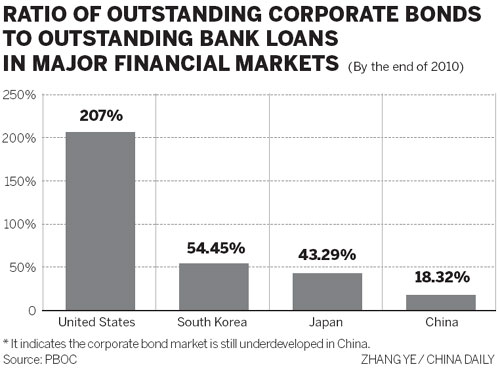
Last year, Chinese banks became even more reluctant to lend to SMEs, which typically lack fixed assets and have poor credit records, after the central bank tightened its monetary policies significantly to battle surging inflation. To keep their business running, many SMEs resorted to underground usury for lines of credit that can command an annualized interest rate as high as 90 percent.
In the city of Wenzhou, the birthplace of China's private economy, in East China's Zhejiang province, debt-laden entrepreneurs, unable or unwilling to repay their debts, fled in droves, threatening to damage the real and virtual economies.
"Being able to issue bonds, SMEs can borrow more easily and at reasonable prices," said Zhao.
Premier Wen Jiabao cited the boosting of direct financing as one of the important goals of the country's financial reform in his annual government work report in March.
On the buy side, junk bonds afford investors, especially those with a higher risk appetite, with one more tool to choose from when arranging their portfolios. In a country that has one of the world's highest saving rates, more lucrative investment products could help put more of those unproductive savings to work.
The launch of high-yield bonds is especially good news for the country's hedge funds, a nascent industry that emerged after China introduced short-selling to its stock market in 2010. With a lack of investment tools, hedge funds, known for their sometimes high investment returns, are having problems beating the stock index in China. The Howbuy China Hedge Fund Index, which tracks 174 hedge funds nationwide, was only slightly above the CSI 300 stock index last year, realizing returns of just 4.65 percent.
A high-yield fixed income market will also change the way the country's fund managers work. With high-yield bonds, good fund managers will be able to outperform their counterparts through calculations and portfolio arrangements, rather than living at the mercy of the elements. During the last bull market, it's reported that some fund managers outperformed the market by simply buying all the stock under a certain price.
Wang Danlin, executive general manager of the investment banking department of JP Morgan First Capital Securities Co, told local media that the yield of a high-yield bond should be more than 10 percent and would vary according to the issuers' credit rating and guarantees.
Southwest Securities' Wang feels the move could also have an impact on the stock market.
"The market will act as a test field in selecting future IPO candidates. Having companies first issue bonds before they go public will educate them to attach greater attention to their credit record and so raise the quality of the country's public companies," said Wang.
Chinese public companies are known for their reluctance to pay out dividends. Wang said they will have to pay out more or lose investors once the high-yield bond market has risen in scale.
For a junk bond market to flourish, analysts say, related derivatives including credit default swaps should be introduced to provide investors with tools to hedge risks. Hedging is a relatively new concept in China, where the capital markets could not be shorted until short-selling was introduced. For now, the size of the country's interest rate swaps and credit default swaps markets is largely irrelevant, since defaults are rare in the State-dominated bond market.
An incomplete regulatory framework could also wreak havoc in the high-yield bond market.
"Introducing high-yield bonds is beneficial to the financial market only if there is a transparent information-disclosure system and issuers and investors are properly regulated," said Lu Zhengwei, chief economist with Industrial Bank Co.
Lu said the high-risk nature of the high-yield bond market calls for even tighter regulation than other markets. But the prospects for sound regulation seem remote given the notoriety of the nation's stock markets.
In a sign that shows the growing underlying risks in the country's bond market, the country saw its first-ever AAA bond default and its first-ever default on a special bond designed for smaller businesses in January. Both were quickly resolved and creditors were repaid in full but the defaults shone a light on the level of risks that would be involved with high-yield bonds.
Angang, one of China's largest producers of steel, was behind the payment of an AAA-rated 5 billion yuan three-year note by Jan 4. On the morning of that day, the China Government Securities Depository Trust and Clearing Co said it "had not received sufficient funds from the issuer". In the afternoon, however, it posted a new notice, saying the debt had been paid.
Also in January, Beijing DG Telecommunications Equipment Co, a manufacturer of wireless systems, said it had applied for its bond guarantor to cover debts that it could not repay. It had borrowed 44 million yuan in 2010 as one of 13 SMEs whose debt issues were combined together into a single bond - an innovation designed to divide up risks for creditors and make it easier for the SMEs to obtain direct financing. The bond guarantor, Beijing Zhongguancun Sci-tech Guarantee Co, said that it had arranged for full payment of the amount in default.
"It's a sure thing that China will have high-yield bonds as its economy keeps growing. The problem is not whether to have them but how we can constantly improve them to make sure they benefit the real economy," said Southwest Securities' Wang.
gaochangxin@chinadaily.com.cn
